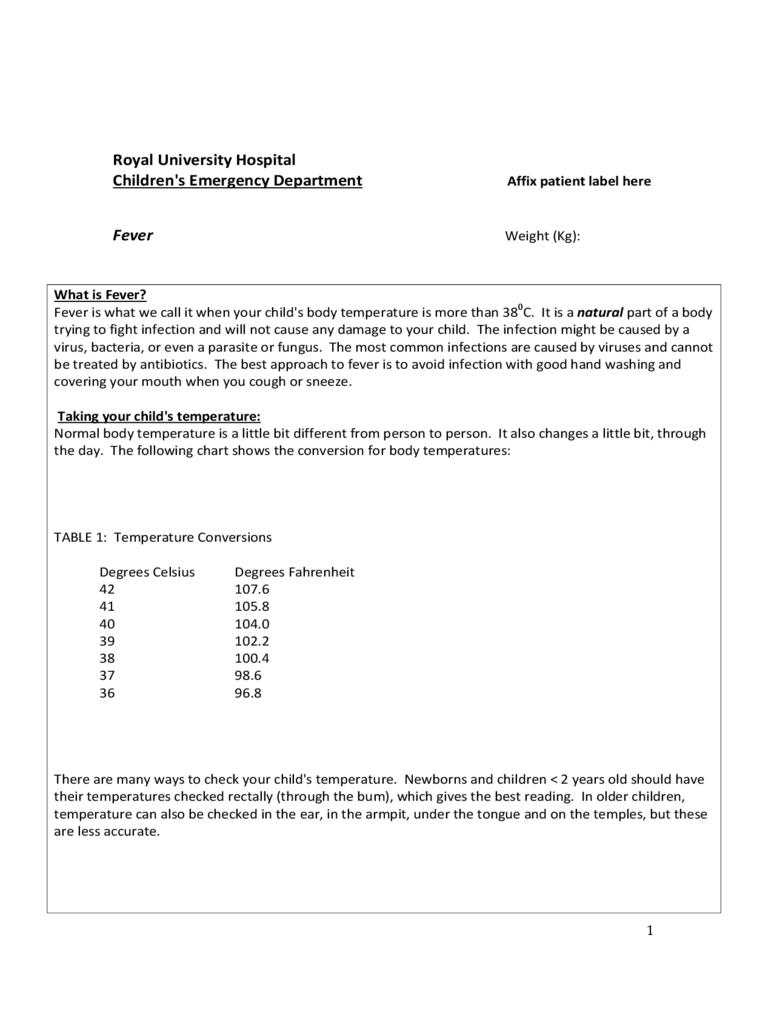Fillable Printable Fever Handout
Fillable Printable Fever Handout

Fever Handout

Royal University Hospital
Children's Emergency Department Affix patient label here
Fever Weight (Kg):
What is Fever?
Fever is what we call it when your child's body temperature is more than 38
0
C. It is a natural part of a body
trying to fight infection and will not cause any damage to your child. The infection might be caused by a
virus, bacteria, or even a parasite or fungus. The most common infections are caused by viruses and cannot
be treated by antibiotics. The best approach to fever is to avoid infection with good hand washing and
covering your mouth when you cough or sneeze.
Taking your child's temperature:
Normal body temperature is a little bit different from person to person. It also changes a little bit, through
the day. The following chart shows the conversion for body temperatures:
TABLE 1: Temperature Conversions
Degrees Celsius Degrees Fahrenheit
42 107.6
41 105.8
40 104.0
39 102.2
38 100.4
37 98.6
36 96.8
There are many ways to check your child's temperature. Newborns and children < 2 years old should have
their temperatures checked rectally (through the bum), which gives the best reading. In older children,
temperature can also be checked in the ear, in the armpit, under the tongue and on the temples, but these
are less accurate.
1

Royal University Hospital
Children's Emergency Department Affix patient label here
Fever Weight (Kg):
Treating Fever
The most important thing to remember is that you do not have to TREAT fever! Temperature will
normally go up and down when your child is sick. Fever helps to fight infection and IT IS NOT HARMFUL.
Even if it goes HIGHER than 39 degrees!!!! However, children with fever are often uncomfortable and have
low energy, glassy eyes, poor appetite, aches and pains, and they can be very cranky.
It is okay to make your child more comfortable by treating the fever with medicine. Acetaminophen
(Tempra®, Tylenol®) and ibuprofen (Motrin®, Advil®) work well and should only be given as necessary for
discomfort. Ibuprofen may lower temperature more, work faster and last longer. Based on your child's
weight of ________kg, the best doses are:
• Ibuprofen________(10mg/kg) every 6-8 hours or
• Acetaminophen_______(15mg/kg) every 4-6 hours, maximum 5 doses per day.
Both medications are usually safe. Be careful with acetaminophen. It can cause irreversible liver failure
with overdoses. It is a good idea to respect the recommended doses of both medications.
Children with fever may become dehydrated and are usually less interested in solid food. It is very
important to make sure that your child drinks and passes urine while he/she is sick. Appetite for solid foods
will return once he/she feels better.
When to see a doctor:
Fever tells you that your child is ill. How high the fever gets is usually not important as the cause of the
fever. Even minor infections can cause high fever. If your child has worrisome signs, he/she should see a
doctor. Some young children have seizures with fever ("febrile seizures"). However, lowering the fever will
not prevent these seizures, and most typical febrile seizures do not cause long-term problems.
Signs of possible serious illness with fever include: difficulty breathing, confusion, seizure, dehydration,
bloody diarrhea, severe stomach pain, severe headache or neck stiffness, and non-blanching rash (doesn't
turn white when you press on it).
Your child should also see a doctor if he/she has a fever for more than 3-4 days or is < 3 months old.
This list is not exhaustive. Trust yourself as a parent, if you are worried it is always okay to bring your child
to the doctor.
For more information, contact HealthLine at: 811
2



